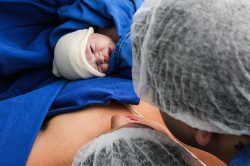Newborns Addicted to Opioids Recover More Quickly When Rooming with Moms, says Study
Babies who are born addicted to opioids usually recover in the neonatal intensive care unit or NICU, where they can be monitored closely by nurses and doctors who administer medications like methadone to help them safely through withdrawal. But a new study shows that babies born with neonatal abstinence syndrome experience better recovery rates when kept in hospital rooms with their mothers. The rate of babies born with NAS in the U.S. has increased by roughly 400% in the last 20 years in tandem with rates of nationwide opioid use.
What is Neonatal Abstinence Syndrome, and Why Does it Happen?

Neonatal abstinence syndrome, or NAS, is a group of conditions that occur when babies withdraw from drugs they were exposed to while in utero. When a mom uses drugs like opioids, cocaine, and amphetamines, these substances can pass from the bloodstream to the placenta, and trigger drug dependence in unborn babies. Babies with NAS can experience withdrawal symptoms like tremors, diarrhea, and vomiting for up to six months after birth, and are often at higher risk for birth defects, seizures, and premature birth.
NAS is most commonly caused by opioids, but can also be caused by substances like barbiturates and alcohol. In the U.S., one baby is born with NAS every 25 minutes. Newborns with NAS generally stay in the hospital for an average of 17 days, while babies born without NAS usually only stay in the hospital for 2.1 days.
Benefits of NAS Babies Recovering Next to Mom
The latest study published in JAMA Pediatrics examined the outcomes of 549 babies with NAS who were addicted to opioids. Some of these babies recovered in the NICU, while others were allowed to recover in hospital rooms next to their mothers while going through opioid withdrawal. The researchers found that babies who recovered in rooms next to their moms were 63% less likely to require drugs like methadone during withdrawal. They also found that these babies left the hospital an average of 10 days earlier than babies recovering in the NICU.
The study authors say that breastfeeding, bonding, and skin-to-skin contact are all factors proven effective at improving a newborn’s health — especially those born with NAS. Existing evidence shows that skin-to-skin contact can help babies adjust to their post-womb environments, increase their weight gain, and reduce babies’ levels of the stress hormone cortisol. Skin-to-skin contact also helps reduce pain and improves sleep patterns in babies who may be suffering insomnia and irritability as part of opioid withdrawal.
The study authors note that while babies with NAS generally experience better recovery outcomes when rooming with their moms, this option isn’t always possible, depending on the mother’s health. Some moms may be struggling with their own severe opioid withdrawal symptoms that prevent them from being lucid and adequately caring for their newborns.
Getting Help for Addiction When You’re Pregnant
When you’re pregnant and suffering from addiction, it’s normal to feel scared and confused about what to do to keep both you and your baby safe. Continued drug use can lead to birth complications and increase the risk for an overdose or death, while quitting cold turkey is just as dangerous and could lead to stillbirth, respiratory depression, and suicidal ideation. The safest way to get help for addiction when you’re pregnant is to slowly detox from drugs at a drug detox center where doctors can monitor your withdrawal and that of your unborn baby’s.
Drug detox centers develop customized detox treatments for pregnant women based on their current health status and level of abuse. In most cases, pregnant women are put on tapering schedules so they can gradually reduce their opioid use without quitting abruptly and putting themselves and their babies at risk. Pregnant moms addicted to opioids may be given methadone or buprenorphine to replace the drug of abuse, though studies show buprenorphine is more effective at relieving opioid withdrawal symptoms in babies with NAS.
If you are pregnant and addicted to opioids, understand that you’re not alone, and that getting help now is the safest thing you can do for both you and your baby. Call our 24/7 confidential helpline at 800-996-6135 to learn more about free and low-cost detox treatments, and to find the nearest drug detox center ready to help you and your baby experience a healthy recovery from addiction.

